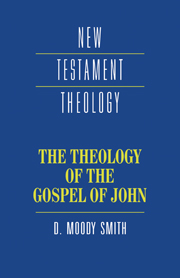Book contents
- Frontmatter
- Contents
- Dedication
- Editor's preface
- Preface
- List of abbreviations
- 1 Introduction
- 2 The setting and sources of Johannine theology
- 3 The themes of Johannine theology
- 4 The theology of John and the issues it raises
- List of further reading
- Index of references
- Index of modern authors
- Index of subjects
1 - Introduction
Published online by Cambridge University Press: 17 December 2010
- Frontmatter
- Contents
- Dedication
- Editor's preface
- Preface
- List of abbreviations
- 1 Introduction
- 2 The setting and sources of Johannine theology
- 3 The themes of Johannine theology
- 4 The theology of John and the issues it raises
- List of further reading
- Index of references
- Index of modern authors
- Index of subjects
Summary
John the evangelist obviously did not write a theological treatise, but a Gospel, a narrative of the ministry of Jesus Christ that stands alongside three broadly similar narratives in the New Testament. Moreover, the Greek words theologia and theologos (theology and theologian) are nowhere to be found in the New Testament. These terms only gradually came to be applied to discourse about God in the Christian tradition, however, so it is no surprise that John does not use them or that we do not find them in the New Testament. Yet in antiquity John was given the title of theologian, if not already in the second century by Papias, then in the fifth by Philip of Side, who quotes him. Certainly the title has seemed apposite, for John more than any of the other Gospel writers deals with theological matters. That is, in John's Gospel more than in any of the others, Jesus, the Son, talks about his relationship with God, the Father.
Christian theology begins with the fact of Jesus Christ. That fact became first the object of faith and then the object of thought. “It was a complex fact: a man who is Son of God, dead yet living, weak yet Lord. It demanded that God be seen as Father of a Son, the two of them acting through a Holy Spirit who is at once immanent in the ‘hearts’ of the faithful and transcendent over them.”
- Type
- Chapter
- Information
- The Theology of the Gospel of John , pp. 1 - 9Publisher: Cambridge University PressPrint publication year: 1995



